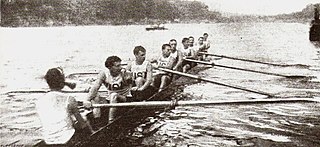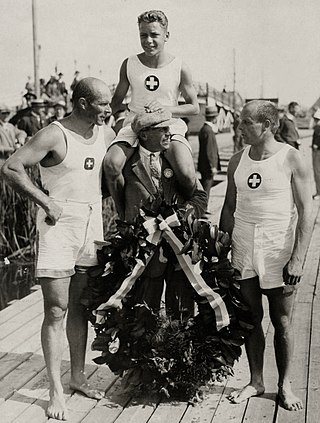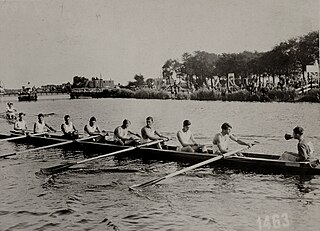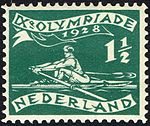
Romania competed at the 2004 Summer Olympics in Athens, Greece, from 13 to 29 August 2004. Romanian athletes have competed at every Summer Olympic Games since its official debut in 1924, missing only two editions, including the 1948 Summer Olympics. The Romanian Olympic and Sports Committee sent the nation's smallest team to the Games since the 1988 Summer Olympics in Seoul. A total of 108 athletes, 50 men and 58 women, had competed in 16 different sports, most notably in artistic gymnastics and rowing. For the third time in Olympic history, Romania was again represented by more female than male athletes.

Rowing is the oldest intercollegiate sport in the United States. The first intercollegiate race was a contest between Yale and Harvard in 1852. In the 2018–19 school year, there were 2,340 male and 7,294 female collegiate rowers in Divisions I, II and III, according to the NCAA. The sport has grown since the first NCAA statistics were compiled for the 1981–82 school year, which reflected 2,053 male and 1,187 female collegiate rowers in the three divisions. Some concern has been raised that some recent female numbers are inflated by non-competing novices.

The equestrian events at the 1928 Summer Olympics included dressage, eventing, and show jumping. All three disciplines had both individual and team competitions. The competitions were held from 8 to 12 August 1928. Teams were now fielded by three riders, rather than four, the purpose being to reduce pressure on national federations to find that many riders in order to compete for team medals. Riders had to be considered amateurs, which was defined as either an actively serving professional officer, or as a gentleman rider as defined by the rules of that rider's national governing body. A total of 113 entries were present from 20 nations: Argentina, Austria, Belgium, Bulgaria, Czechoslovakia, Denmark, Finland, France, Germany, Hungary, Italy, Japan, the Netherlands, Norway, Poland, Portugal, Spain, Sweden, Switzerland, and the USA. This was the first appearance for Hungary, Japan and Argentina in equestrian events at an Olympics. Additionally, after being shut out from two Olympic competitions, Germany also returned to the Games to win a few medals in the equestrian events.

The men's coxed four was one of the competitions in the Rowing at the 1900 Summer Olympics events in Paris. The competition was plagued by controversy involving which boats should advance to the final. In one of the most unusual decisions in Olympic history, two separate finals were held for the event, each of which is still considered an Olympic championship by the International Olympic Committee. The crews of all six boats to compete in the two finals are Olympic medallists.

The men's eight was one of the competitions in the Rowing at the 1900 Summer Olympics events in Paris. It was held on 25 and 26 August 1900. 5 boats, involving 46 rowers from 5 nations, competed. The event was won by the United States, represented by the Vesper Boat Club. Silver went to the Royal Club Nautique de Gand of Belgium, with bronze to Minerva Amsterdam from the Netherlands.

At the 1928 Summer Olympics in Amsterdam, seven fencing events were contested, six for men and one for women.

France competed at the 1928 Summer Olympics in Amsterdam, Netherlands. 255 competitors, 219 men and 36 women, took part in 112 events in 17 sports. At the beginning of the games there was an incident where a French coach was physically assaulted by a Stadium gatekeeper who refused him entry. It boiled over to a point where the entire French team did not participate in the Parade of Nations, and conversations were made to pull out of the games completely. However, the issue was resolved and France went on to compete.

Rowing at the 1948 Summer Olympics featured seven events, for men only. Competitions were held over the Henley Royal Regatta course from 5 to 9 August.

At the 1928 Summer Olympics in Amsterdam, four diving events were contested. The men's plain high diving event was dropped from the Olympic program. The competitions were held from Monday, 6 August 1928 to Saturday, 11 August 1928.

Achim Hill was a German rower who competed for the United Team of Germany in the 1960 Summer Olympics and in the 1964 Summer Olympics and for East Germany in the 1968 Summer Olympics.
Humphrey Colman Boardman was an English rower who competed for Great Britain at the 1928 Summer Olympics at Amsterdam. He was born in Norwich. He was the younger brother of Christopher Boardman who won gold in the Sailing at the 1936 Summer Olympics. Their father, Edward Thomas Boardman, was a Norwich architect, as was, their grandfather Edward Boardman. Their mother, Florence, was the daughter of Jeremiah Colman (MP) owner of Colman's Mustard.

The men's single sculls event was part of the rowing programme at the 1928 Summer Olympics. It was one of seven rowing events for men and was the seventh appearance of the event, which had been on the programme for every Games since rowing was added in 1900. There were 15 competitors, each from a different nation. The event was won by Bobby Pearce of Australia, the nation's first medal in the event. Silver went to Ken Myers of the United States, extending that nation's podium streak to three Games. David Collet of Great Britain took bronze; that nation had also earned a medal each time it appeared and had a five-Games podium streak.

The men's coxed pair event was part of the rowing programme at the 1928 Summer Olympics. It was one of seven rowing events for men and was the fourth appearance of the event. It was held from 3 to 10 August near Sloten, Amsterdam. There were 6 boats from 6 nations, with each nation limited to one boat in the event. The event was won by the Swiss team, the nation's second consecutive victory in the event. Brothers Hans Schöchlin and Karl Schöchlin rowed, with Hans Bourquin the coxswain. Another pair of brothers took silver: France's Armand Marcelle and Édouard Marcelle. The Belgian bronze medal team consisted of Léon Flament, François de Coninck, and Georges Anthony; it was the nation's first medal in the event.

The men's coxed four event was part of the rowing programme at the 1928 Summer Olympics. It was one of seven rowing events for men and was the fifth appearance of the event. It was held from 3 to 10 August. There were 11 boats from 11 nations, with each nation limited to a single boat in the event. The event was won by Italy, the nation's first medal in the men's coxed four. The Italian team dethroned two-time reigning champion Switzerland, beating the Swiss crew in both the semifinals and the final. Switzerland's silver medal brought its podium streak in the event to three Games; the United States had its two-Games medal streak end. Poland took bronze, its first medal in the event.

The men's eight event was part of the rowing programme at the 1928 Summer Olympics. It was one of seven rowing events for men and was the seventh appearance of the event, which had been on the programme for every Olympic Games since rowing was added in 1900. It was held from 2 to 10 August 1928. There were 11 boats from 11 nations, with each nation limited to a single boat in the event. The event was won by the United States, the third consecutive victory for the Americans in the event and fifth overall. Great Britain returned to the podium after a one-Games absence in 1924 broke a three-Games medal streak, taking silver this time. Defending silver medalists Canada took bronze.

The men's coxed four competition at the 1932 Summer Olympics in Los Angeles took place at the Long Beach Marine Stadium. It was held from 10 to 13 August. There were 7 boats from 7 nations, with each nation limited to a single boat in the event. The event was won by Germany, the nation's first victory in the event since 1912 and third overall. Defending champions Italy came within 0.2 seconds of repeating, with Germany passing them at the very end of the final. Poland won its second consecutive bronze medal.
The men's eight competition at the 1932 Summer Olympics in Los Angeles took place at the Long Beach Marine Stadium. It was held from 10 to 13 August. There were 8 boats from 8 nations, with each nation limited to a single boat in the event. The event was won by the United States, the nation's fourth consecutive and sixth overall victory; the Americans had won every time they competed. Silver went to Italy, that nation's second medal in the men's eight after a bronze in 1924. Canada repeated as bronze medalists, stretching their podium streak in the event to three Games.
The men's single sculls competition at the 1936 Summer Olympics took place at Grünau Regatta Course, near Berlin, Germany. The event was held from 11 to 14 August. There were 20 competitors from 20 nations, with each nation limited to a single boat in the event. The event was won by Gustav Schäfer of Germany, the nation's first victory in the event and first medal of any colour in the men's single sculls since 1908. Josef Hasenöhrl took silver, Austria's first medal in the event. Dan Barrow earned bronze, extending the United States' podium streak in the event to five Games; the Americans had taken a medal in each of the six times they competed in the event.

The men's coxed four competition at the 1956 Summer Olympics took place at Lake Wendouree, Ballarat, Australia. It was held from 23 to 27 November and was won by the team from Italy. There were 10 boats from 10 nations, with each nation limited to a single boat in the event. Italy had previously won this event in 1928, tying Switzerland for second-most wins among nations. Sweden (silver) and Finland (bronze) each won their first medal in the men's coxed four. Switzerland had its three-Games silver-medal streak broken, without a Swiss crew competing.















